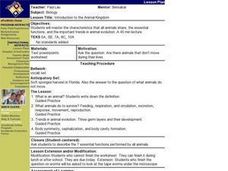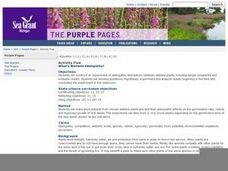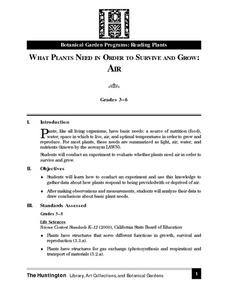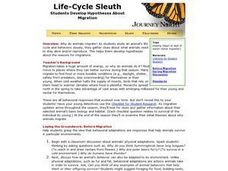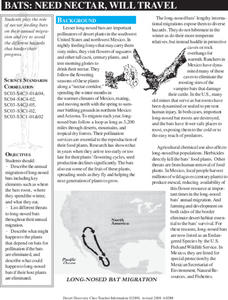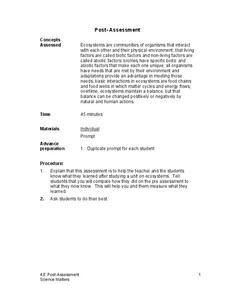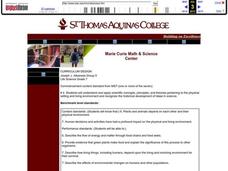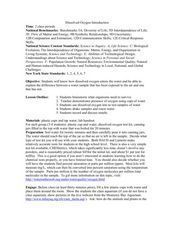Curated OER
Introduction to the Animal Kingdom
Students are asked: Are there animals that don't move during their lives. They are asked what is an animal? Students discuss what animals need to survive. They are taught the trends in animal evolution. Students discuss the three...
Disney
Where Do Brown Bears Live?
What do brown bears in Alaska's Katmai National Park need to survive? Pupils explore the unique habitats, diet, and survival needs of this animal. They predict the consequences of removing any integral part of the bear's survival, and...
New York State Department of Environmental Conservation
Adaptations – Designs for Survival
What's the difference between behavioral adaptations and physical adaptations? Learn about the various ways that organisms adapt to their environment with a worksheet about the creatures of the Hudson River.
Curated OER
Basic Needs of Living Things - Lesson Two
Fourth graders study and identify the basic needs of a variety of organisms. Terrariums and aquariums are used to demonstrate what plants, animals, and fish need to stay alive. These two classic models are used to effectively convey what...
Curated OER
What's Wetland Allelopathy?
Students study plants and what they need to thrive and survive. They make plant extracts from chosen wetland plants and test their allelopathic effects on the germination rate, radicle growth, and hypocotyl growth of test seeds of other...
Curated OER
Survival Extravaganza
Fifth graders discuss the effects of scarcity. In this survival lesson plan, 5th graders use strategies that would help them survive in a survival situation. Students write letters about bears in need of help to survive. Students answer...
Curated OER
What Plants Need in Order to Survive and Grow: Soil
Students conduct an experiment to evaluate whether plants need soil to survive and grow. They plant two seeds, one with soil and one without, make predictions, and record and analyze the seed germination results on a worksheet.
Curated OER
What Plants Need in Order to Survive and Grow: Air
Students conduct an experiment to determine whether plants need air in order to survive and grow. They discuss natural resources, analyze slides, and observe and record data from the experiment.
Channel Islands Film
Dark Water: Lesson Plan 2 - Grade 3
A discussion of bioluminescence launches an investigation of animal adaptations. After re-watching the opening minutes of Dark Water, class members listen to a reading of What Do You Do with a Tail Like This, and then create a new animal...
Curated OER
Life-Cycle Sleuth
Students analyze an animal's life cycle and behaviors, and examine what animals need to stay alive and reproduce. They develop theories and hypotheses about the reasons for migrations, using the Journey North online project.
Curated OER
Responses to Changes in the Environment
Fourth graders study ecosystems, and see how plants and animals must adapt to changes in their environment in order to survive. Pictures of the snow shoe hare in the winter and summer are shown. Learners determine that the change in...
Columbus City Schools
Get Your Organisms Organized
From large to small, show your class how to organize them all! Included within the guide is everything you need to take their knowledge of classification from the cellular to the species level. The worksheets focus on building vocabulary...
Curated OER
Cycles and Starting Mealworms
Here is a fascinating lesson about the life cycles of plants and animals, and other cycles found in nature. Learners explore the cycle of the moon, the tides, and other sequences of events in every day life. The big activity is the...
Curated OER
Bats: Need Nectar, Will Travel
Beginning wildlife biologists become adult bats, baby bats, snakes, owls, bobcats, or land-clearing developers in a grand role-playing activity. In a large open space, they play a game in which they move to designated areas based on what...
American Museum of Natural History
What's This? Breathing
Crazy fact: Some animals can survive months without oxygen. An online resource describes some unique ways animals collect oxygen and even live without it for an extended time. Learners read about these special animals and use pop-up...
American Museum of Natural History
What do you know about Biodiversity?
What do your classes know about biodiversity? A 10-question online quiz asks questions related to biodiversity and species groups. As learners answer questions, they click on links to additional information. The lesson could be an option...
Science Matters
Post-Assessment
Twenty questions make up an assessment designed to test super scientists' knowledge of ecosystems. Scholars answer multiple-choice and short-answer questions about organisms, food chains, energy flow, and more.
Curated OER
Researching Polar Animals
Second graders read the questions about polar animals and use the Internet to perform a search for the answers to the questions. They click on the blue links to go to the particular website with the answers and then print off their sheet.
Curated OER
Plants and Animals
Seventh graders discover the interconnectedness of plants and animals in ecosystems. In groups, they create a food web and discuss the problems when one link of the chain is broken. To end the lesson, they set up a balanced environment...
Virginia Department of Education
Molar Heat of Fusion for Water
How can you describe heat of fusion in a way the class understands and relates the importance of this concept to present day issues? In this third activity of the series, learners conduct an experiment, demonstrating the flow of heat...
Michigan State University
May I Take Your Order?
If you're a pest, come and get a tasty meal here! Scholars work collaboratively to construct a mini restaurant out of a shoe box and create a menu that feeds a pest their favorite food.
Curated OER
Dissolved Oxygen Introduction
Students are shown how dissolved oxygen enters the water. They are taught the difference between a water sample that has been exposed to the air and one that has not. Students brainstorm what organisms need to survive. They use dissolved...
Michigan State University
Create an Animal
Think beyond the animals and habitats we've already discovered and allow scholars to dream up their very own habitat and an animal that lives there. Class members present the new habitat and animal on a poster alongside an...
Curated OER
Education: Passing Enough Knowledge to Survive to the Next Generation
Students compare and contrast the knowledge requirements for human and animal children. They identify the consequences of an animal if it is unprepared for the given environment. They discover the importance of education as well.


